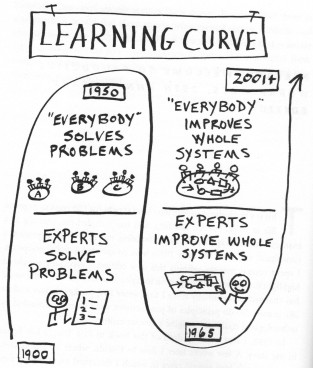I am always looking out for simple models that illuminate more effective ways of acting, especially when they relate to teams and organizations since these are the units of work in today’s world. Thus, I was pleased when I came across the following model at yet another excellent OSR seminar during which Marvin Weisbord spoke of his life’s work of experience exploring and describing how to improve organizations and communities. In particular, he showed a simple diagram, which I have scanned from the brand-new 25th anniversary, 3rd edition of his book Productive Workplaces: Dignity, Meaning, and Community in the 21st Century:
This diagram illustrates how our strategies for effective organizations have evolved over the last 100+ years. In 1900, the trend was for experts to solve problems. Insights into group dynamics in the 1950s led to adding a new strategy to the mix: “everybody” solving problems. The rise of general systems theory in the 1960s resulted in experts improving whole systems. This evolved in the 2000s to be “everybody” improving whole systems. Each addition provided a new set of tools and approaches that are helping to drive productivity to new all-time levels. Experts have led the way creating knowledge and practices that were then adopted by “everybody”.
Marvin goes on to say:
“While the four learning curve strategies coexist, if you aspire to dignity, meaning and community, you won’t be satisfied until you get everybody improving the whole. Not if you seek the economic benefits from ever-changing technologies.”
Dignity. Meaning. Community. Those are laudable goals. And essential parts of what make us human. And economic benefits are needed along the way.
Since becoming a professor in September 2010, I’ve been thinking more and more about our higher educational system and how to improve it to become even more effective. Marvin’s diagram resonates with me. It connects with my understanding of the complex systems in which we live and act: biology, organizations, products, teams, etc. One of the most illuminating descriptions of complex systems that I have found is David Snowden’s video describing the sense-making Cynefin Framework.
In complex systems cause and effect are only obvious in hindsight, changes to the system are largely irreversible, and the system has unpredictable, emergent outcomes. There are no “best practices” or “right answers”. The system is too large, too diverse, with too many interacting parts for any one person to understand the system. This is no longer the domain of experts. Every practice needs to be contextualized, adapted for the particular context of that person, and the context is always changing as is the person. Thus, practices need to be continually modified to respond to the emergent behaviors of the system.
In such complex systems, the most effective leadership move is to create an environment in which “everybody” does lots of experiments to continually learn about how to best adapt their practices. In other words, create a situation where “everybody” improves whole systems.
So what does this mean for UW Bothell, where I work?
UW Bothell is in the upper left quadrant of the Cynefin framework: it is a complex system (an organization) working with complex systems (students, staff, faculty, their families, communities, industries, etc.) doing complex activities (learning). We need to continually adapt to the changing context of the systems that we are in. We need to be acting in the upper right quadrant of Marvin’s Learning Curve diagram.
Are we training our students to effectively act in complex systems? Are we providing them with tools, principles, practices, and experience of being part of “everybody” improving whole systems? Do they understand that there are different types of systems with different ways of acting effectively? Do they understand what “whole systems” means? Do the faculty and staff emulate these practices?
And perhaps most important, how can we get “everybody” improving the whole UW Bothell system?



